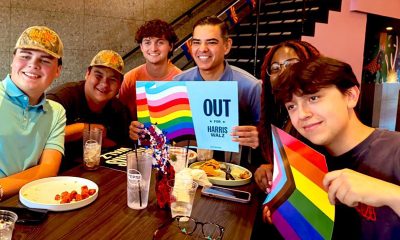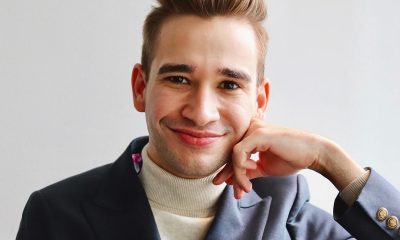News
Meet the new LGBTQ liaison for the Democratic National Committee
Sam Alleman joins DNC after work in abortion rights movement
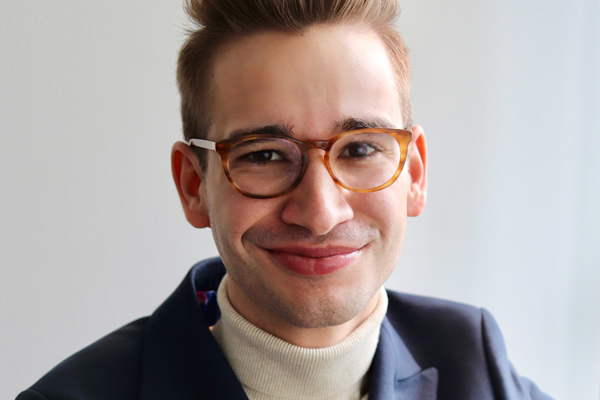
The new LGBTQ liaison for the Democratic National Committee comes from a background not in LGBTQ advocacy, but in the abortion rights movement, and sees the two as working “hand in hand” for a common cause.
Sam Alleman, who started Monday as LGBTQ coalitions director for the DNC, said in an interview with the Washington Blade that his previous job as political outreach manager for five years at the Planned Parenthood Action Fund will inform his LGBTQ work going forward.
“The reproductive rights movement goes hand in hand with what we’ve been fighting for in the LGBTQ equality and equity movement as well,” Alleman said. “There is no being LGBTQ without your ability to have bodily autonomy and to make those same choices.”
The relationship between the LGBTQ movement and abortion rights may be more pronounced in the coming months: A national battle is taking place over a Texas law banning abortion in the state for any woman pregnant for more than six weeks as the U.S. Supreme Court will consider litigation with the potential to overturn Roe v. Wade. LGBTQ legal advocates, faced with a term at the Supreme Court with no major cases specific to LGBTQ rights, are already turning their focus to the abortion cases.
“I think that the gender equity lens here, as we move toward building out that permanent infrastructure that really brings all of those things together through more of a social justice lens, will be absolutely critical to being successful, particularly speaking to our younger demographics, to making sure trans and queer people feel included in a way that’s actually equitable and just,” Alleman said.
Alleman identified two key priorities for him in his new role at the DNC — turning out LGBTQ voters for Democratic candidates and building an internal infrastructure for the LGBTQ community — and said his previous work at Planned Parenthood Action Fund working with candidates and coalition groups will help him reach that goal.
“I really plan to use a lot of the lessons that I learned there in building out to making an inclusive campaign, both in programs and in voter contact infrastructure, within the party itself as well,” Alleman said.
Alleman, reiterating he was still in the first days of his job, said the process for building out the LGBTQ community infrastructure at the DNC is still in its initial phases. Alleman said his vision would be not only turning out LGBTQ voters, but finding a way that “allows them to plug in as volunteers and leaders within the party to do the voter contact to hold the events on the ground, to work with our state party partners, and making sure that their voices are represented.”
Key to building out that infrastructure, Alleman said, would be making sure all voices within the LGBTQ community are heard. Alleman made a special point to say queer and transgender people “who have been our partners for so long and deserve a seat at the table” will be an essential part of the infrastructure.
The voice of LGBTQ people, Alleman said, will be increasingly important in elections as the numbers of voters who identify as LGBTQ increase. Pointing to 2020 exit polls showing 7 percent of the electorate identified as LGBTQ, Alleman said more LGBTQ people than ever turned out in the presidential election and overwhelmingly backed Biden by 61 percent. (Republicans were also able to claim a small victory, having doubled their share of LGBTQ voters from 14 percent to 28 percent who voted for Donald Trump after the previous election.)
“We know that that demographic is only growing,” Alleman said. “Within under 18 year olds, approximately 16 percent of folks identify as LGBTQ in this country. So really my priorities are building out an infrastructure here at the DNC, that will turn out LGBTQ voters for Democratic candidates as they become a larger and larger subsection of our voting population.”
Alleman joins the Democratic National Committee days before a Virginia gubernatorial election observers see as a national bellwether for upcoming congressional midterm elections. Terry McAuliffe, a Democratic former governor who said in a interview with the Blade his opponent is the “most homophobic, anti-choice” candidate in Virginia history, is running against Glenn Youngkin, who said recently he continues to oppose same-sex marriage but “will support” the law.
Polls show an exceedingly close race in a state President Biden won handily in the presidential election. An Emerson College/Nexstar Media poll found the race is a dead heat and McAuliffe and Youngkin are tied with 48-48 percent each. The election is Tuesday.
Asked what he sees as his role in the closing days of the Virginia election, Alleman reiterated he was still on Day One of his role at the DNC, but believes Democrats are “doing everything possible to turn out different constituency groups for Terry McAuliffe and Democrats, up and down the ballot in Virginia.”
“My role as I start to step in here is really working to make sure that our national partner organizations are doing everything possible to turn out that book as we head into GOTV, and be a partner to them as they drive their supporters out to make sure that we’re not leaving anything on the table come next Tuesday when we elect Terry McAuliffe governor of Virginia again,” Alleman said.
Lucas Acosta, a spokesperson for the DNC who joined in on the interview with Alleman, said the DNC is working with groups such as the Human Rights Campaign (his former employer) to highlight the records of both Virginia candidates.
“I think what happened last week — Youngkin’s comments on same-sex marriage — are concerning,” Acosta said. “That’s definitely something that we are going to continue to highlight in the closing days of the campaign. That obviously is just a further example why Youngkin is not the moderate he purports to be, but rather a Trump acolyte, who is going to turn back time on rights for a litany of Virginians, including LGBTQ folks.”
Democrats have enjoyed an advantage as a result of the sea change in support in favor of LGBTQ rights. But things may be beginning to shift as LGBTQ issues change and move away from same-sex marriage to other battlegrounds, such as transgender people participating in school sports consistent with their gender identity.
Washington Post columnist James Hohmann reported this week on new data from the National Republican Senatorial Committee finding gender and race issues play out in favor of Republicans among suburban voters, if they’re on terms like critical race theory or concepts like “genderism.” According to the data, 65 percent said “allowing biological males to compete against women in high school and college sports is hugely unfair and will erase many of the gains women have made in athletics over the last 50 years.”
Just this week, Texas Gov. Greg Abbott signed into law House Bill 25, which effectively bars transgender girls from participating in school sports consistent with their gender identity, making the Lone Star State the latest state to enact such a measure in defiance of federal laws against discrimination based on sex.
Alleman, asked whether the DNC would change the way it approaches these issues, said he wasn’t aware of the data and questioned whether the conclusion of the data “really makes much sense.”
“I think we’ll at least continue to push forward the message of what we’ve done as Democrats which is fight for these individuals to be treated just the same as everyone else,” Alleman said.
Virginia
Youngkin calls on gay Va. GOP LG candidate to exit race over alleged ‘porn’ scandal
John Reid denounces ‘fabricated internet lie’ as anti-gay smear campaign
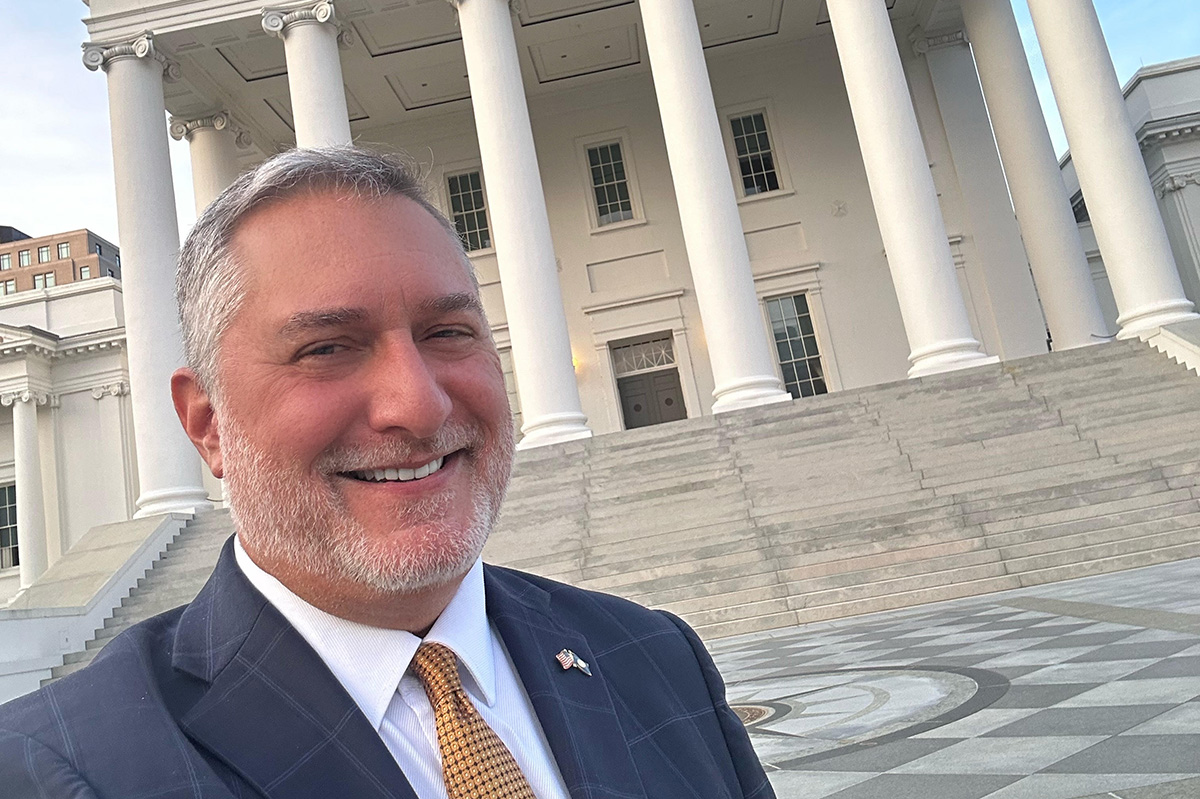
Less than a week after John Reid, the conservative gay radio talk show host from Richmond secured the Republican nomination for the office of lieutenant governor in Virginia, sensational allegations have surfaced, which he strongly denies, that he allegedly posted pornographic photos on social media.
According to the Virginia Mercury newspaper, the allegations surfaced when Virginia Gov. Glenn Youngkin’s office released a statement saying Youngkin contacted Reid on Friday, April 25, and asked him to withdraw his candidacy over reports that a social media account with Reid’s username included “pornographic content” that was “shared” with others.
“The governor was made aware late Thursday of the disturbing online content,” the Virginia Mercury quotes a Youngkin spokesperson as saying. “Friday morning, in a call with Mr. Reid, the governor asked him to step down as the lt. governor nominee,” the spokesperson is quoted as saying.
Reid responded to the allegations in an early Friday evening video he posted on his campaign’s Facebook page, calling the allegations “a totally fabricated internet lie” motivated by anti-gay bias.
“I can tell you that’s not my account and anyone on the internet can open accounts with the same or similar names as other people,” he stated in his video. “It’s predictable,” he added.
“But what I didn’t expect was the governor I have always supported to call and demand my resignation without even showing me the supposed evidence or offering me a chance to respond,” Reid states in his video.
He said he will not drop out of the lieutenant governor’s race and called the allegations against him just the latest in what he said was an ongoing effort by some in the Republican Party, especially conservative Christians, to force him out of politics.
“Let’s be honest,” he said. “it’s because I’m openly gay. And I have never backed down to the establishment, and will not,” he continued in his video message. “What happened today is another coordinated assassination attempt against me to force the first openly gay candidate off of a Virginia statewide ticket.”
Reid added, “It’s shameful, and I won’t back down, even though I know the plan is for the attacks to continue in this overt effort to make me toxic.”
Reid secured the GOP nomination for lieutenant governor last week after his only rival in the Republican primary, Fairfax County Supervisor Pat Herrity, dropped out of the race for health reasons.
By securing the nomination Reid became the first known openly gay candidate, Republican or Democrat, to be nominated for a statewide office in Virginia.
In an interview with the Washington Blade earlier this week Reid pointed out that he came out as gay in 1996 or 1997 on National Coming Out Day in his role as TV news anchor in Richmond, where he worked for 10 years.
Following that, Reid worked as a radio talk show host for the next eight years, promoting his ideas as a gay conservative Republican, up until shortly before he announced his candidacy for lieutenant governor, he told the Blade.
Reid’s video responding to the accusations against him can be accessed here.
Reid’s campaign website and statements he has released to the media acknowledge his status as a gay candidate but point out he has a long record of support for conservative Republican positions on a wide range of issues that are against the positions of most mainline LGBTQ rights organizations.
“I’m not a diversity hire,” he stated in a press release issued at the time he announced his candidacy in January. “I’m the most conservative and proven candidate running, and I’ve boldly stood up for our beliefs in a way that should make my personal life a total nonissue,” he stated.
A statement on his campaign website states “John is uniquely positioned to take the fight to the radical progressives head on as he continues his fight against boys in girls’ sports and the extreme trans agenda being forced upon our children.”
His campaign website statement on transgender issues concludes by saying, “And we must be blatant in saying that it is factually impossible for biological men or women to personally decide to change their gender. John believes in the right for grown adults to live their lives as they see fit, but not if they impose restrictions and obligations on others and not if any of their behavior sexualizes or grooms children.
Politics
George Santos sentenced to 87 months in prison for fraud case
Judge: ‘You got elected with your words, most of which were lies.’
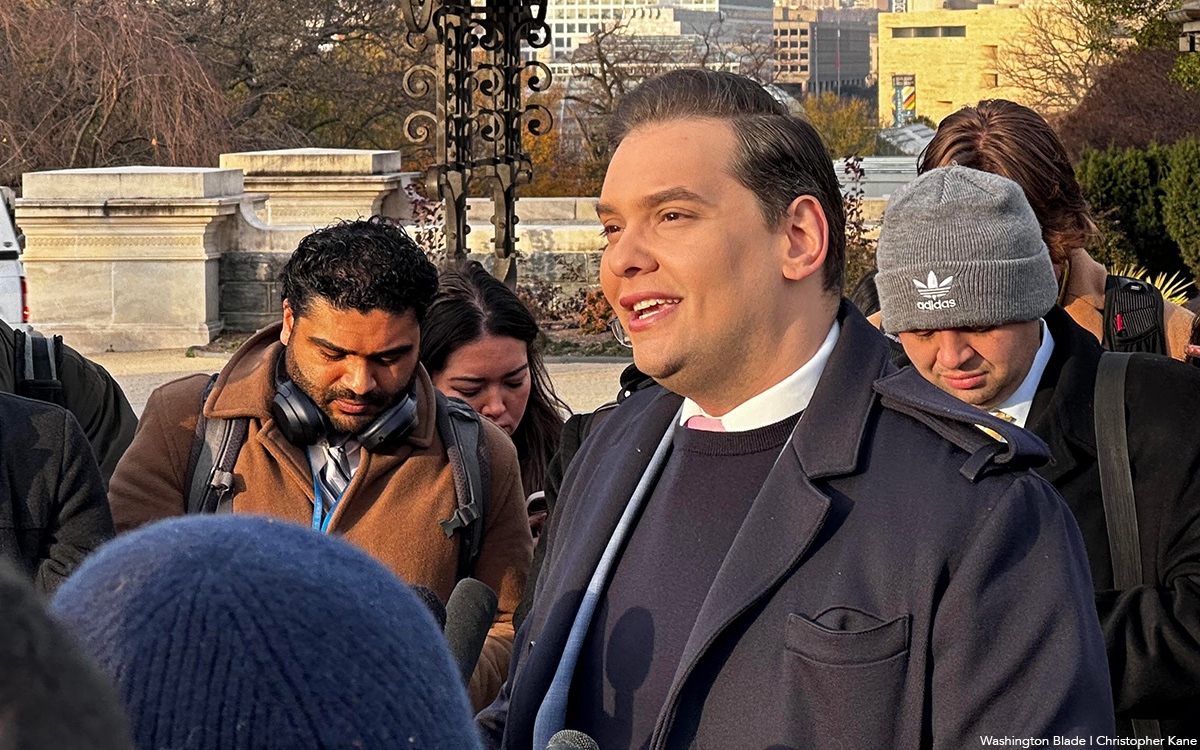
Disgraced former Republican congressman George Santos was sentenced to 87 months in prison on Friday, after pleading guilty last year to federal charges of wire fraud and aggravated identity theft.
“Mr. Santos, words have consequences,” said Judge Joanna Seybert of the U.S. District Court for the Eastern District of New York. “You got elected with your words, most of which were lies.”
The first openly gay GOP member of Congress, Santos became a laughing stock after revelations came to light about his extensive history of fabricating and exaggerating details about his life and career.
His colleagues voted in December 2023 to expel him from Congress. An investigation by the U.S. House Ethics Committee found that Santos had used pilfered campaign funds for cosmetic procedures, designer fashion, and OnlyFans.
Federal prosecutors, however, found evidence that “Mr. Santos stole from donors, used his campaign account for personal purchases, inflated his fund-raising numbers, lied about his wealth on congressional documents and committed unemployment fraud,” per the New York Times.
The former congressman told the paper this week that he would not ask for a pardon. Despite Santos’s loyalty to President Donald Trump, the president has made no indication that he would intervene in his legal troubles.
Maryland
A Baltimore theater educator lost jobs at Johns Hopkins and the Kennedy Center
Tavish Forsyth concluded they could not work for Trump

BY WESLEY CASE | Tavish Forsyth had come to a conclusion: They could not work for President Donald Trump.
So the 32-year-old Baltimore resident stripped down, turned on their camera, and lit their career on fire.
“F—— Donald Trump and f—— the Kennedy Center,” a naked Forsyth, an associate artistic lead at the Washington National Opera’s Opera Institute, which is run by the Kennedy Center, said in a video that went viral. The board of the nation’s leading cultural institution had elected Trump just weeks prior as its chairman after he gutted the board of members appointed by his predecessor, President Joe Biden.
The rest of this article can be read on the Baltimore Banner’s website.
-

 Federal Government3 days ago
Federal Government3 days agoHHS to retire 988 crisis lifeline for LGBTQ youth
-

 Opinions3 days ago
Opinions3 days agoDavid Hogg’s arrogant, self-indulgent stunt
-

 District of Columbia3 days ago
District of Columbia3 days agoD.C. police seek help in identifying suspect in anti-gay threats case
-

 Virginia3 days ago
Virginia3 days agoGay talk show host wins GOP nom for Va. lieutenant guv



